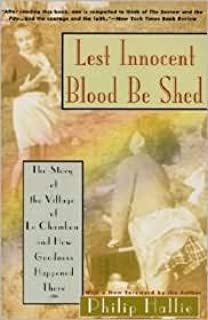Books |
Lest Innocent Blood Be Shed: The Story of the Village of Le Chambon and How Goodness Happened There
Philip Hallie
By
Published: Mar 23, 2021
Category:
History
Two French policemen, acting on the orders of their Nazi masters, came to the little village of Le Chambon on a February evening in 1943. Their purpose: arrest the minister, Andre Trocme, who was known to be doing something to save Jews.
That arrest proved a more difficult task than they imagined.
First, the minister invited them in to dinner. The chief of police said he did not have the heart to eat. Then Trocme’s parishoners started arriving, each carrying something Trocme might need in prison. The chief of police sat over his untouched food, weeping. “I have never seen such a farewell,” he said.
He had no idea what else he wasn’t seeing. Hidden in the attic were Jews; in the cellar were more. For years, the Trocme children had been sharing their food with so many Jewish kids that their daily rations were two lumps of sugar, some tasteless beans and one thick slice of bread.
All told, this tiny community took responsibility for the lives of about 2,500 Jews.
Why?
Because it was the “right thing to do.” No deeper reason than that for these people — they had a pastor who embodied goodness, and they followed his lead.
Organization?
There was none. People needed to make quick decisions on their own to protect their Jewish guests; they had no time to consult with higher-ups. Besides, an organization would just add to the danger — better that only Trocme knew where the Jews were. [To buy the paperback from Amazon, click here. There is another, more recent book that tells this story. I haven’t read it, but the Amazon reviews for “Love in a Time of Hate: The Story of Magda and Andre Trocme and the Village That Said No to the Nazis” are strong. To buy the paperback, click here. For the Kindle edition, click here.]
The book has its thrills: Trocme’s release, his accidental re-arrest by the Gestapo and his dazzling daylight escape, an unintentional murder in his house, a suicide-by-hanging. But you’ll want to know more than the stories of Trocme and his inner circle. Beyond “the right thing to do,” you’ll want to know what the people of Le Chambon felt, and what they did, and what they thought after the war was over. You’ll want to hear from the Jews whose lives were saved. And you’ll want to hear from the Nazis, posted in a nearby town and totally aware that something was going on in Le Chambon. You’ll want, in short, to know the details of this remarkable story — and, sadly, you won’t get them.
The strength of this book is the insistence that courage is a function of personal character, not of a belief system. It’s also the book’s weakness. Philip Hallie was an American Jewish professor of ethics and philosophy at Wesleyan; his fascination was with values, not deeds. In other hands, this book might have been a bestseller and a huge influence; as it is, you have to pick your way through small minefields of overripe “spiritual” prose.
And yet…it’s worth it. In a time when self-sacrifice is rare, even a half-tale of goodness is inspiring. You can fill in the blanks in this remarkable story. What you’ll have a much harder time doing is imagining a town behaving like this now — or, for that matter, opening your front door and seeing a hunted person and saying, “Yes, come in. And welcome.”


